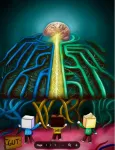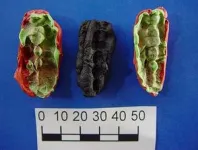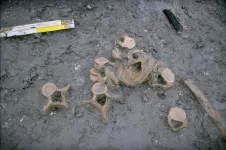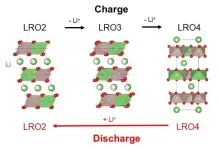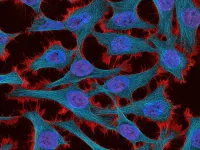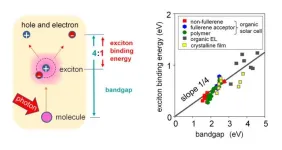(Press-News.org) Philadelphia, PA (January 18, 2024) – Understanding why we overeat unhealthy foods has been a long-standing mystery. While we know food's strong power influences our choices, the precise circuitry in our brains behind this is unclear. The vagus nerve sends internal sensory information from the gut to the brain about the nutritional value of food. But, the molecular basis of the reward in the brain associated with what we eat has been incompletely understood.
Now, a new study published in Cell Metabolism by a team from the Monell Chemical Senses Center, unravels the internal neural wiring, revealing separate fat and sugar craving pathways, as well as a concerning result: Combining these pathways overly triggers our desire to eat more than usual.
"Food is nature's ultimate reinforcer,” said Monell scientist Guillaume de Lartigue, PhD, lead author of the study. “But why fats and sugars are particularly appealing has been a puzzle. We've now identified nerve cells in the gut rather than taste cells in the mouth are a key driver. We found that distinct gut-brain pathways are recruited by fats and sugars, explaining why that donut can be so irresistible." Ultimately this research provides insights on what controls “motivated” eating behavior, suggesting that a subconscious internal desire to consume a diet high in both fats and sugar has the potential to counteract dieting efforts.
The team used cutting-edge technology to directly manipulate fat or sugar neurons in the vagus nerve system and demonstrated that both types of neurons cause a dopamine release in the brain's reward center in mice. They discovered two dedicated vagus nerve pathways: one for fats and another for sugars. These circuits, originating in the gut, relay information about what we have eaten to the brain, setting the stage for cravings.
To determine how fats and sugars affect the brain, the team stimulated gut vagal nerves with light. This, in turn, induced the mice to actively seek stimuli, in this case food, that engage these circuits. The results indicated that sugar and fat are sensed by discrete neurons of the vagus nerve and engage parallel but distinct reward circuits to control nutrient-specific reinforcement.
But the story doesn't end there. The team also found that simultaneously activating both the fat and sugar circuits creates a powerful synergy. "It's like a one-two punch to the brain's reward system," said de Lartigue. "Even if the total calories consumed in sugar and fats stays the same, combining fats and sugars leads to significantly more dopamine release and, ultimately, overeating in the mice."
This finding sheds light on why dieting can be so challenging. Human brains may be subtly programmed to seek out high-fat, high-sugar combinations, regardless of conscious efforts to resist. "The communication between our gut and brain happens below the level of consciousness," said de Lartigue. "We may be craving these types of food without even realizing it."
The team predicts that this line of research offers hope for future development of anti-obesity strategies and treatments. Targeting and regulating gut-brain reward circuits could offer a novel approach to curb unhealthy eating habits. "Understanding the wiring diagram of our innate motivation to consume fats and sugars is the first step towards rewiring it," said de Lartigue. "This research unlocks exciting possibilities for personalized interventions that could help people make healthier choices, even when faced with tempting treats."
de Lartigue’s co-authors are Molly McDougle, Alan de Araujo, Arashdeep Singh, Mingxin Yang, Isadora Braga, Vincent Paille, Rebeca Mendez-Hernandez, and Brandon Warren, all from the Monell Center; Macarena Vergara, Abhishek Gour, Abhisheak Sharma, and Nikhil Urs, all from the University of Florida, and Lauren N. Woodie, University of Pennsylvania.
The research was supported by the National Institutes of Health (R01 DK116004, R01 Q15, DK094871, F31 DK1311773); an AHA postdoctoral fellowship and grants from the SanteDige Foundation and Phillip Foundation.
###
The Monell Chemical Senses Center is an independent nonprofit basic research institute based in Philadelphia, Pennsylvania. Founded in 1968, Monell‘s mission is to improve health and well-being by advancing the scientific understanding of taste, smell, and related senses, where our discoveries lead to improving nutritional health, diagnosing and treating disease, addressing smell and taste loss, and digitizing chemosensory data.
END
Monell Center study: New gut-brain circuits found for sugar and fat cravings
Results reveal a “one-two punch” to the brain's reward system, possibly impeding dieting efforts
2024-01-18
ELSE PRESS RELEASES FROM THIS DATE:
Ancient chewing gum reveals stone age diet
2024-01-18
What did people eat on the west coast of Scandinavia 10 000 years ago? A new study of the DNA in a chewing gum shows that deer, trout and hazelnuts were on the diet. It also shows that one of the individuals had severe problems with her teeth.
Some 9 700 years ago, a group of people were camping on the west coast of Scandinavia, north of what is today Göteborg. They had been fishing, hunting and collecting resources for food. And some teenagers, both boys and girls, were chewing resin to produce glue, just after ...
Hidden cause of lithium-rich cathode materials’ low energy efficiency revealed
2024-01-18
1. A research team consisting of the National Institute for Materials Science (NIMS) and Softbank Corp. has found that voltage hysteresis in Li2RuO3—a high-energy-density rechargeable battery cathode material—is caused by differences in the intermediate crystalline phases formed during charge and discharge processes. Voltage hysteresis is a phenomenon detrimental to lithium (Li)-ion batteries in which discharge voltage becomes significantly lower than charge voltage. These results revealed a voltage-hysteresis-causing mechanism inconsistent with conventional theory.
2. ...
Next-generation batteries could go organic, cobalt-free for long-lasting power
2024-01-18
In the switch to “greener” energy sources, the demand for rechargeable lithium-ion batteries is surging. However, their cathodes typically contain cobalt — a metal whose extraction has high environmental and societal costs. Now, researchers in ACS Central Science report evaluating an earth-abundant, carbon-based cathode material that could replace cobalt and other scarce and toxic metals without sacrificing lithium-ion battery performance.
Today, lithium-ion batteries power everything from cell phones to laptops to electric vehicles. One of the limiting factors for realizing a global shift to energy produced by renewable sources — particularly for the transition ...
FAU Engineering receives $2.6 million NSF grant for CyberCorps student scholarship program
2024-01-18
The College of Engineering and Computer Science of Florida Atlantic University received a $2.6 million grant from the National Science Foundation (NSF) to establish a scholarship program in the burgeoning and critical field of cybersecurity. The NSF’s CyberCorps® Scholarship for Service program seeks to increase the number of qualified cybersecurity professionals working for federal, state, local, territorial and tribal governments.
The program is managed by the NSF in collaboration with the United States Office of Personnel Management and the U.S. Department of Homeland Security. FAU is one of only six universities ...
AI harnesses tumor genetics to predict treatment response
2024-01-18
In a groundbreaking study published on January 18, 2024, in Cancer Discovery, scientists at University of California San Diego School of Medicine leveraged a machine learning algorithm to tackle one of the biggest challenges facing cancer researchers: predicting when cancer will resist chemotherapy.
All cells, including cancer cells, rely on complex molecular machinery to replicate DNA as part of normal cell division. Most chemotherapies work by disrupting this DNA replication machinery in rapidly dividing tumor ...
AMS 2024 Annual Meeting highlights climate challenges and solutions
2024-01-18
[Boston, MA—January 18, 2023] The American Meteorological Society’s (AMS) 104th Annual Meeting will gather thousands of people at the Baltimore Convention Center 28 January–1 February to attend the world’s largest annual meeting focused on weather, water, and climate. The AMS is the professional society for everyone in the atmospheric and hydrologic sciences and services, including meteorologists, research scientists, emergency managers, academics, weather broadcasters, and more.
“The theme of our 104th Annual Meeting is ‘Living in a Changing Environment,’” says AMS President Brad Colman. “It’s ...
Tackling antibiotic resistance when treating pneumonia
2024-01-18
New research has been published that identifies positive steps towards a better understanding of antimicrobial resistance (AMR), specifically in hospital-acquired pneumonia (HAP).
Antimicrobial, or antibiotic resistance, is a growing global issue, yet little is known about how to dose antibiotics to minimise bacteria developing resistance in patients. However, the University of Liverpool is playing a key role in contributing to international efforts to better understand AMR.
In a paper published today (Thursday 18 January), ...
Stuck in traffic: Researchers identify cellular traffic jams in a rare disease
2024-01-18
Researchers from McGill University, led by Professor Alanna Watt of the Department of Biology, have identified previously unknown changes in brain cells affected by a neurological disease. Their research, published in eLife, could pave the way to future treatments for the disease.
Spinocerebellar ataxia type 6, known as SCA6, is a rare neurological disease that disrupts the function in a part of the brain called the cerebellum, causing difficulties with movement and coordination. The condition results from genetic mutations, ...
Study examines substance use in first responders during the COVID-19 pandemic
2024-01-18
Considerable attention has focused on burnout and mental health of physicians and nurses on the frontline during the COVID-19 pandemic. First responders – law enforcement personnel, firefighters and emergency medical service (EMS) providers, also experienced increased levels of stress, anxiety and depression due to job-related pressures associated with the pandemic.
Given their exposure to work-related stress during this time, first responders may have been at considerable risk of developing problematic substance use. However, little is known about the factors associated with first responder drug and alcohol use during the pandemic.
A study by Florida ...
Lighting the path: Exploring exciton binding energies in organic semiconductors
2024-01-18
Organic semiconductors are a class of materials that find applications in various electronic devices owing to their unique properties. One attribute that influences the optoelectronic property of these organic semiconductors is their "exciton binding energy," which is the energy needed to divide an exciton into its negative and positive constituents. Since high binding energies can have a significant impact on the functioning of optoelectronic devices, low binding energies are desirable. This can help in reducing energy losses in devices like organic solar cells. While several methods for designing organic materials with low binding energies have ...
LAST 30 PRESS RELEASES:
Pollen exposure linked to poorer exam results taken at the end of secondary school
7 hours 18 mins may be optimal sleep length for avoiding type 2 diabetes precursor
Around 6 deaths a year linked to clubbing in the UK
Children’s development set back years by Covid lockdowns, study reveals
Four decades of data give unique insight into the Sun’s inner life
Urban trees can absorb more CO₂ than cars emit during summer
Fund for Science and Technology awards $15 million to Scripps Oceanography
New NIH grant advances Lupus protein research
New farm-scale biochar system could cut agricultural emissions by 75 percent while removing carbon from the atmosphere
From herbal waste to high performance clean water material: Turning traditional medicine residues into powerful biochar
New sulfur-iron biochar shows powerful ability to lock up arsenic and cadmium in contaminated soils
AI-driven chart review accurately identifies potential rare disease trial participants in new study
Paleontologist Stephen Chester and colleagues reveal new clues about early primate evolution
UF research finds a gentler way to treat aggressive gum disease
Strong alcohol policy could reduce cancer in Canada
Air pollution from wildfires linked to higher rate of stroke
Tiny flows, big insights: microfluidics system boosts super-resolution microscopy
Pennington Biomedical researcher publishes editorial in leading American Heart Association journal
New tool reveals the secrets of HIV-infected cells
HMH scientists calculate breathing-brain wave rhythms in deepest sleep
Electron microscopy shows ‘mouse bite’ defects in semiconductors
Ochsner Children's CEO joins Make-A-Wish Board
Research spotlight: Exploring the neural basis of visual imagination
Wildlife imaging shows that AI models aren’t as smart as we think
Prolonged drought linked to instability in key nitrogen-cycling microbes in Connecticut salt marsh
Self-cleaning fuel cells? Researchers reveal steam-powered fix for ‘sulfur poisoning’
Bacteria found in mouth and gut may help protect against severe peanut allergic reactions
Ultra-processed foods in preschool years associated with behavioural difficulties in childhood
A fanged frog long thought to be one species is revealing itself to be several
Weill Cornell Medicine selected for Prostate Cancer Foundation Challenge Award
[Press-News.org] Monell Center study: New gut-brain circuits found for sugar and fat cravingsResults reveal a “one-two punch” to the brain's reward system, possibly impeding dieting efforts
